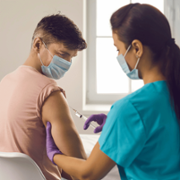The Need for Science-Based Messages to Address the Mpox Global Emergency
By Tatiana Masters, PhD, MSW & Lauren Ranalli, MPH | September 26, 2024
The recent upsurge in mpox across several countries in Africa led to the World Health Organization (WHO) declaring it a public health emergency of international concern on August 15th, 2024. Declarations of health emergencies are important, but they can also cause increases in anxiety and the spread of misinformation.
Research documents that misinformation escalates during health emergencies, as we saw in the early months of the COVID-19 pandemic and misinformation can have significant impacts on individual behaviors as well as community public health. For example, misinformation has led to decreased childhood vaccination rates resulting in dangerous measles outbreaks, as well as to taking ineffective or even harmful medical advice.
As a science-based organization, ETR | Education, Training, and Research is committed to providing medically accurate, inclusive, and empowering health education in the communities we serve. Clinicians and health educators play a critical role in disseminating evidence-based information to patients, students, and community members. These messages should focus on the following:
Vaccination: Provide up-to-date information from the CDC on mpox vaccine recommendations, including who should get vaccinated, the importance of completing the full two-dose vaccine sequence, and where to locate vaccines in your community.
Types of Exposure: Emphasize that mpox spreads among humans through close or intimate contact, or by touching objects that have been used by someone with mpox and not disinfected. Currently, there is no evidence that mpox is spread through water in pools, hot tubs, or splash pads.
General Hygiene: Encourage messages that support general hygiene practices, especially for those who are exposed to someone with mpox. This could include social distancing, wearing a mask, or washing your hands.
Sexual Health: Provide CDC guidelines on how to practice safer sex and lower your risk for mpox. When communicating about safer sex, it’s important to provide sexual health education that is inclusive of all sexual orientations and gender identities.
Help empower your patients, students, or community members by asking person-centered questions that can help them identify which practices will work best in their daily lives. Questions can include:
-
How do you think your behaviors might affect your risk of getting mpox?
-
What motivates you to stay healthy and protect yourself and your partners from mpox?
-
What steps do you think you could take to protect yourself and your partners from mpox?
-
What would make it easier for you to take those steps?
Reduce Stigma: Use non-judgmental language. Emphasize that mpox can affect anyone and avoid stigmatizing messages that associate the virus with specific groups. Research shows that stigma can prevent people from seeking care, contribute to the spread of the disease, and result in under-reporting of cases.
With scientifically grounded prevention information, clinicians and health educators can engage patients, students, and others to help control the spread of mpox and protect themselves and their communities.
Tatiana Masters, PhD, MSW (she/her) is a Senior Methodologist at ETR with over 15 years of experience in qualitative and quantitative sexual and reproductive health research and evaluation.
Lauren Ranalli, MPH (she/her/hers) is the Director of Communications and Public Affairs at ETR and has over 20 years of experience in public health and adolescent health services.




